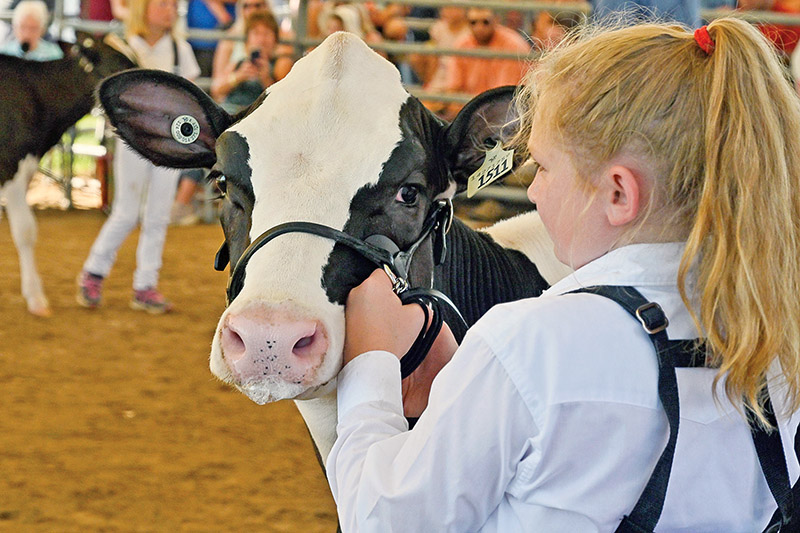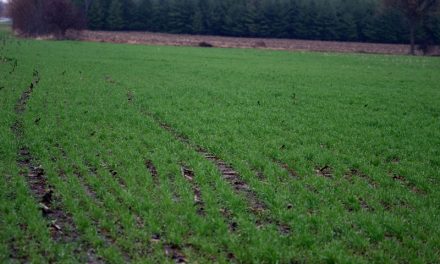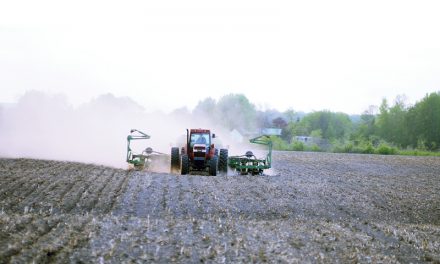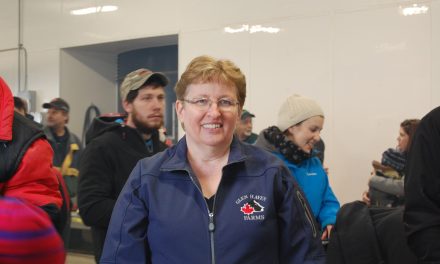Tinkess Photo
ONTARIO – Fair organizers, rural exhibitions, and agricultural societies across Canada are concerned about proposed changes to the countries’ Livestock Traceability Regulations.
The regulations have been in place to ensure farm animals, when they are moved from place to place, for example for a beef auction can be identified quickly through their identification tags. The idea behind the tags is to be able to track any illness in an animal so that one animal cannot go back to a farm and infect all of the other animals of the same type on that farm.
Most if not all sectors of the agricultural industry accept the regulations as necessary ones.
The Livestock Identification and Traceability Program (TRACE) has been administered jointly by the Canada Food Inspection Agency and the agricultural industry since 2001.
The proposed changes to the existing regulations would have local agricultural fairs and the volunteers helping out, with their various programs, responsible for finding and replacing any lost tags on any animal that is showing at a fair or agricultural event.
Other changes to the regulations include a proposed requirement for agricultural societies to record and submit animal information.
Local agricultural fair boards and the Canadian Association of Fairs and Exhibitions (CAFE), have expressed their concern about placing the responsibility of replacing tags on animals at fairs as being one fair volunteers will not be able to do.
They are afraid that the work that the dwindling number of volunteers do at fairs and agricultural events would be an over burden by these added measures.
Recording and submitting information about animals at a fair most likely would become difficult and onerous for volunteers to carry out.
CAFE is made up of agricultural groups from across Canada.
The Ontario Association of Agricultural Societies, (OAAS) executive director Vince Brennan, said, “First and foremost, the OAAS, the Canadian Association of Fairs and Exhibitions (CAFE), and our provincial counterparts would like to express our full support for the program and its objectives. Traceability is a critical component of a successful Canadian agricultural landscape, necessary to ensure the health and safety of our animals, food, and citizens.
A press release from CAFE stated: “The objective of the national Livestock Identification and Traceability program is to provide accurate and up-to-date information on livestock identity, movement, and location to mitigate the impact of disease outbreaks, food safety issues, and natural disasters. While our industry supports the program and its objectives, we are concerned that the proposed changes would place an increased burden on their operations, which we cannot bear.
“We agree that supporting a streamlined national traceability system is essential to consumer confidence and animal health and safety,” says Kryssie Thomson, interim executive director of the Canadian Association of Fairs and Exhibitions (CAFE), “We are happy to support ways that do not jeopardize the survival of our members, and in ways that are efficient and make sense.”
The additional work that volunteers and agricultural event organizers would have to bear could result in more than 5,000 animal events across Canada put at risk. More than half of those programs involve 4-H or youth because most organizers have already suggested they would have to cancel some of these programs because of a lack of volunteers to take on the extra monitoring.
Eighty-three per cent of people involved in animal-related shows and events are volunteers. This group dedicates an estimated 844,000 hours annually across Canada to these programs, CAFE said groups across Canada are already facing volunteer shortages for the work that currently needs to be done.
Brennan added, “We do not agree with agricultural societies being burdened with the responsibility of collecting and reporting animal movement information or of being responsible to supply and apply replacements for lost or missing identifiers/ear tags for livestock present on agricultural societies’ fairgrounds.”
Brennan explained, “Our main concern is that many societies have indicated that the lack of volunteer resources may ultimately result in the cancellation of many, if not all, of their livestock shows, 4-H livestock programs and educational animal displays, if the proposed changes become law. Losing these shows and displays removes perhaps the only opportunity for many non-farm adults and children to meet and be exposed to livestock and the agri-food industry.”
The OAAS feels along with its provincial and national partners that the responsibility of reporting movement, to and from fairgrounds should be the reasonability of the farm or farm owner who the animal belongs to.
The agricultural groups involved and affected by the regulation changes have put together a three-part campaign to hopefully change the proposed regulations.
The OAAS, with their national and provincial partners, is mounting a campaign to have their agricultural societies, their directors, members, and supporters submit their concerns to CFIA via the “Canada Gazette, Part I, Volume 157, Number 11: Regulations Amending the Health of Animals Regulations (Identification and Traceability).” All submissions to CFIA regarding the proposed changes must be submitted by June 16, 2023 via the Gazette – CFIA has indicated that they will not accept any submissions via email. This is the link to the Canada Gazette – https://canadagazette.gc.ca/rp-pr/p1/2023/2023-03-18/html/reg1-eng.html
This is the link to the CAFE page that has more information and some instructions on submitting information via the Gazette portal – https://www.canadianfairs.ca/livestock-traceability
The second part of the campaign is to have agricultural societies, their directors, members and supporters send emails to the federal ministers of agriculture and health, their MPs and their provincial counterparts with their concerns about the CFIA proposed regulatory changes and the significant effect it will have on their societies, fairs, and livestock and 4-H shows.
Here is the link to the email form: https://www.ontarioagsocieties.com/communication/oaas-news/435-livestock-traceability-information
The third part of our campaign is to contact provincial and federal agricultural organizations such as OFA, livestock breed organizations, and 4-H Ontario and ask for their and their members’ support to provide letters of support for the OAAS and their provincial and national partners.
Brennan said, “For many of us, the 4-H livestock program was a catalyst to our decision to become farmers or become involved in agri-business, and/or get involved with our local agricultural society, livestock breed organizations, county Federation of Agriculture organization or other rural organizations.”













